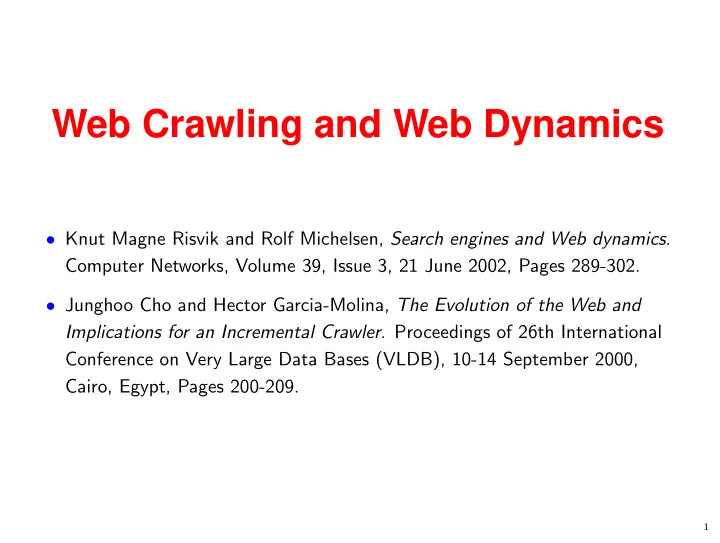

Web Crawling and Web Dynamics • Knut Magne Risvik and Rolf Michelsen, Search engines and Web dynamics . Computer Networks, Volume 39, Issue 3, 21 June 2002, Pages 289-302. • Junghoo Cho and Hector Garcia-Molina, The Evolution of the Web and Implications for an Incremental Crawler . Proceedings of 26th International Conference on Very Large Data Bases (VLDB), 10-14 September 2000, Cairo, Egypt, Pages 200-209. 1
Web Dynamics • The Web is growing at a high pace (exponential) • Documents are updated • Dynamics of the web is shifting – More dynamic and real-time information available – News – The dynamics of the web creates a set of tough challenges for all search engines • The link structure is changing – Using the link structure in ranking creates a slow working positive feedback loop • XML — understand the structure and semantics of the data is a key feature for the next generation engines • Goal : The local store copy must be fresh 2
Local Store • Definition A local store copy is a snapshot of the Web at the given crawling time for each document 3
Types of Crawlers • Periodic/batch crawlers – Periodically rebuild the index from scratch • Incremental crawlers – Updates/refreshes the local collection – Replaces “less-important” pages with new and “more-important” pages 4
Trend • Web servers are today most commonly applications serving HTML files directly from a file system upon requests. • More advanced publication systems tying business applications to the web servers. • The percentage of the web that is actually indexable by search engines is decreasing (the deep web is growing) 5
Web Models • Create a model for how documents are updated, e.g. web documents are updated as independent Poisson processes – Average document changed once every ten days – 50% of all documents are changed after 50 days • Develop a crawling strategy that maximizes the freshness of the local store. • Mechanisms for measuring the freshness of the local store. 6
Cho and Garcua-Molina • Crawling strategies • Freshness = probability of copy in local store is up-to-date • Age = time since late update of real document • Interesting measure = average freshness or age over all documents and time • Refreshing documents using uniform update frequencies is always better than using document update frequencies that are proportional to the estimated document change frequencies • The scheduling policy optimizing freshness penalizes documents that are changed too often 7
FAST crawler • Incremental crawler • Star network • Only exchanging information about discovered hyperlinks • Static mapping from hyperlink information to crawler machines • Scales linearly with document storage capacity • Robust with regards to failure (hyperlink information for an unavailable crawler machine is queued on the sending machine until the designated receiver again becomes available) 8
FAST crawler (cont.) • Scheduling algorithm prioritizing retrieval of documents most likely to have been updated on the web • Will only retrieve new documents when old documents are removed from the local store (e.g. document does not exist on the web anymore) • Maximizes freshness by spending as much as possible of the crawler capacity on refreshing documents that have actually changed. • Adaptively computes estimate of the refresh frequencies • Decreases refresh interval if document changed; otherwise increases refresh interval • Avoids rescheduling any document more than once for each indexing cycle 9
Recommend
More recommend